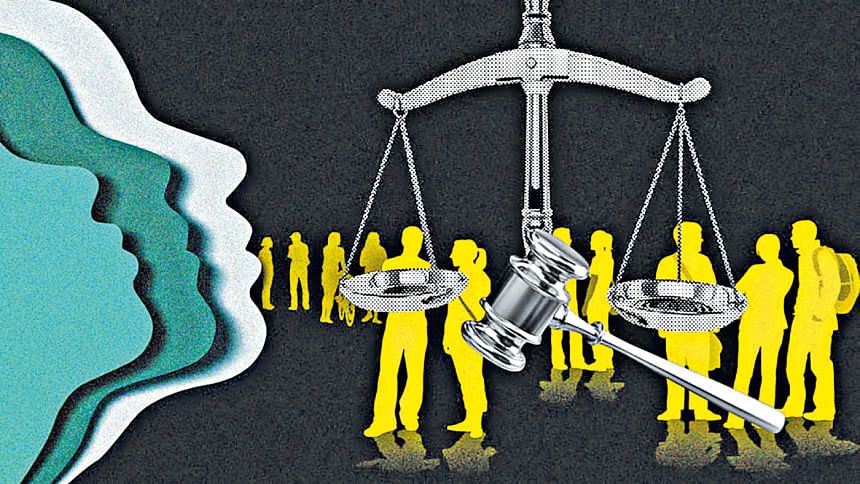Structural reforms to address sexual violence cases

Every year, Bangladesh witnesses horrifying incidents of sexual violence against women, triggering public outrage. Social media erupts in protests, streets fill with demonstrators, and the collective demand for justice—often in the form of capital punishment—grows louder. We are also staging demonstrations, advocating for the establishment of a separate tribunal dedicated to handling rape cases, while some demand public execution for convicted rapists. However, my core argument is that an overarching reform within the entire criminal justice system is imperative; as indeed, piecemeal reform initiatives will not be sustainable.
The issue is not the absence of laws in our country. Bangladesh has legal provisions to punish perpetrators. The Nari o Shishu Nirjatan Daman Ain, 2000, prescribes the death penalty or imprisonment for life as punishments for rape. Special tribunals exist to ensure trials are completed within 180 days. However, legal measures alone seem insufficient, as conviction rates remain dismally low generally. The survey reveals the extremely low conviction rate in rape cases (around 3%), which means that in a substantive number of cases, perpetrators potentially walk free. Several factors are involved in this— influence over and threats against the victims' families, negligence in evidence collection by the police resulting in defective investigations, inefficiency of the prosecution in building the case, the misuse of legal provisions, and prolonged trial proceedings. Strict law does not deter crimes unless they are effectively enforced. Laws exist, but when perpetrators consistently evade punishment, "the fear" of going through the punishment as a legal consequence diminishes. Instead, criminals become more spurred.
Moreover, media coverage significantly impacts public discourse. If a case does not attract media attention, it often goes unnoticed. If the victim does not belong to a well-known institution or a class having social capital and mobility, justice seems even more elusive. Furthermore, if the perpetrator is influential, then often there is no question of justice at all.
Besides, there are societal issues too. In our society, before a victim can even demand justice, they face societal judgment. Questions arise: Was her clothing appropriate? Why was she outside at night? Was this due to a personal relationship? Instead of holding perpetrators accountable, we scrutinise the victims. This victim blaming culture not only silences survivors but also allows the perpetrators to repeat the crimes, and a culture of impunity subsists. Religious education is frequently cited as a solution, but does faith truly permit such crimes? Moral teachings exist in all religions, yet sexual abuse cases have surfaced even in religious institutions. This raises concerns about structural failures rather than the absence of religious teachings.
If Bangladesh is to address the rape crisis, reforms must go beyond demanding harsher punishments. Ending sexual violence is not just about punishment; it is about dismantling the structural barriers and socio-cultural issues that allow it to persist. Unless we address the structural issues, the cycle of violence as well as impunity will continue. To ensure swift and fair justice for rape victims, we need to establish an independent investigation and prosecution service in order to ensure impartiality and build a solid case for justice. This resonates with the reform proposals made by the Police Reform Commission and the Judiciary Reform Commission too. At the end of the day, the purpose of criminal justice system is to uphold justice with transparency, accountability and integrity.
As a society, we must ask ourselves—is the person next to me safe? What is my responsibility?
The writer is final year law student at the University of Dhaka.

 For all latest news, follow The Daily Star's Google News channel.
For all latest news, follow The Daily Star's Google News channel. 



Comments